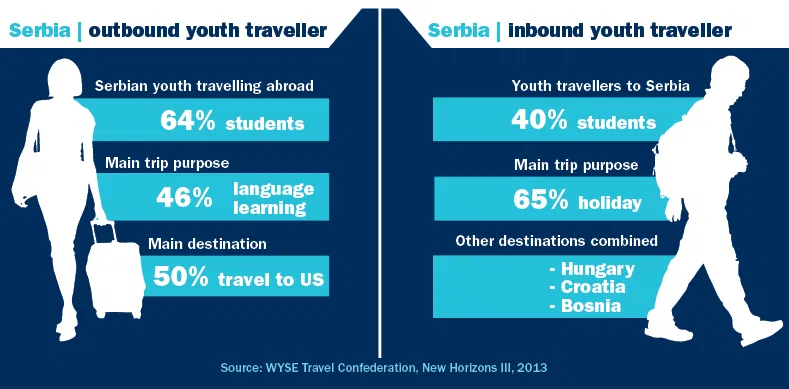Traveling is frequently seen as a transformative experience for people worldwide, especially young people in their prime years. It helps us broaden our perspective, enjoy new cultures, meet new people, and experience new things that can help us form different opinions and grow internally as humans. Even though it seems that travel is easy and accessible to everyone, the situation in Serbia is somewhat different and more complex than it is for other countries in the world. Serbia is well-known as a country with a rich culture and history and has become more connected with other European countries in the past few years but several factors like economic difficulties, cultural dynamics, geopolitics, and general politics affect the amount of travel for young Serbs.
An overwhelming desire to travel has appeared in young Serbs’ minds, mostly the need to travel inside Europe. While it’s easy to travel within the region to countries like Montenegro, Croatia, Bosnia, and others thanks to countries’ ties with the European Union, destinations like Italy, Greece, Austria, Spain, and many others have become even more accessible because the visa regulations have been reduced and more affordable flights have appeared through low-cost airlines like Wizz Air, Ryanair, and Easy Jet. Flights go from a cheap price of just under 40-50 euros for a round-trip ticket with only accommodation left to find, which can sometimes be difficult but still manageable to book.
In Serbia, the majority of young people find it difficult to pay for travel expenses, especially for international destinations, because the economic situation is challenged, meaning the average salary is lower than standards in the EU, for example. Other problems are inflation and currency oscillations, which raise the cost of traveling and further reduce available options for young people. Luxury destinations like Dubai, the Maldives, or on the other side, the USA or even China are hardly on their agendas. Of course, the fact is that there is still a decent number of young Serbs that go to the mentioned destinations, which is encouraging others to work harder and stay motivated on the goal. On the other side, some people are not even thinking of traveling, and are focused on different things in life like studying, working, and mostly just passing by. But, there is an exception, and there are young people who manage to study, work, and travel at the same time, and by their words, we just have to be organized and maximally use up the time we all have in the day.

While the wish and need to travel are not a problem, the travel experiences of young Serbs are further complicated by geopolitical concerns in addition to financial constraints. The requirements for Serbia specify that if a Serbian person wishes to go to the UK and USA, as well as a number of other countries, a visa needs to be obtained (specific visa is also required for longer stays and work in the EU countries), which often discourages citizens from traveling because the process of applying and getting a stamp of approval for a visa can be difficult and very expensive, especially if attempted more than once. Another problem is the ongoing political complex situation regarding relations with Kosovo and other nations.
Even though a lot of young Serbs are keen to travel, the government and educational establishments must play a significant part in making this possible. Young people can receive worldwide experience through programs like Erasmus+ and Flex, which provide scholarships and study or internship opportunities overseas.
By funding travel subsidies, creating youth mobility programs, and collaborating with foreign organizations that encourage intercultural interactions, the Serbian government may potentially take a more active position; financial barriers would be reduced and more young Serbs would have access to the life-changing potential of travel.
Travel goes beyond being an enjoyable experience; it serves as a vital element for personal and social growth. For young people in Serbia, traveling presents chances to immerse themselves in different cultures, broaden their network, and challenge existing stereotypes. Considering Serbia’s varied population and intricate historical background, traveling presents a way of promoting mutual understanding and constructing connections across ethnic and national boundaries. On a personal level, travel cultivates skills that are essential in today’s interlinked society. Encountering diverse languages, traditions, and lifestyles enhances abilities like adaptability, problem-solving, and cross-cultural communication. These competencies are highly sought later in the global job market and are significant for young individuals as they develop their careers and navigate the world as it keeps evolving in many ways.
Furthermore, traveling enables young Serbs to contemplate their own cultural identity. Experiencing life in other nations serves as a reflection that helps them gain a deeper understanding of their heritage, customs, and position in the world. It also nurtures a sense of belonging to a larger global community, which can be a powerful trigger for peace, collaboration, and advancement.
By eliminating the barriers that interfere with youth travel, Serbia can empower its younger generations to be more open-minded, adaptable, and well-equipped for future opportunities. With improved travel access, young Serbs can connect with the global community in meaningful ways, fostering a more interconnected, tolerant, and progressive society.